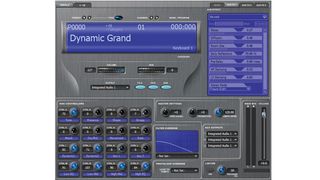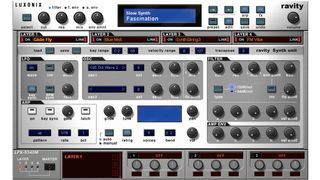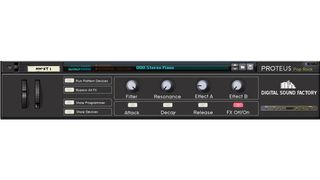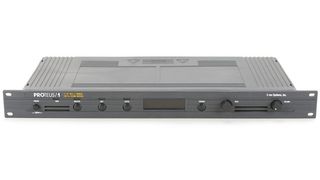The late '80s was the era of the synthesiser workstation. Korg’s M1 - released in 1988 - was on its way to becoming the biggest-selling synth on the planet, with its sizeable collection of onboard samples, a flexible onboard sequencer, and effects processing for sonic sweetening. Other manufacturers had jumped into the fray and these all-in-one instruments were quickly becoming the mainstays of both storefront and stage.
The keyboard workstation was indeed a terrific instrument to own. With such a machine, it was possible to create complete - if simplified - productions entirely at home. The trouble is, these instruments carried with them some overlap with the other hot product of the day: the software sequencer. By the end of the '80s, many electronic musicians had gleaned that the personal computer represented the future, offering unparalleled flexibility and power to those who could afford one. Software MIDI sequencers provided the ability to drive 16 or more channels of MIDI data. Desktop composers didn’t need an instrument with a built-in sequencer, they needed sounds.
For those musicians, E-MU’s Proteus must have been like manna from heaven. Designed as a stop-gap product after EIII sampler sales had proven less than stellar, the Proteus was brilliantly simple, and utterly prescient. It made use of a brand new chip, an elegant single-space rack-mountable enclosure, and a tidy collection of high-quality 16-bit sampled sounds yanked from the not-inconsiderable library the company had developed for its costly samplers.
MIDI magic
Proteus offered a then-whopping 32 voices of polyphony and was 16-part multitimbral by default, making it the ideal companion for computer musicians looking for something to connect to and control with their newfangled software sequencers. Needless to say, it wasn’t just for computer jockeys - loads of MIDI musicians found the Proteus to be a terrific sonic resource - quite a few of them even hooked ’em up to their keyboard workstations!
Because it was possessed of neither filters or effects, the Proteus was largely seen as a prefab band-in-a-box, yet it did provide some amount of patch editing. Sounds could be layered and envelopes and LFOs were available to do some timbral shaping. With abundant real-time MIDI control options, Proteus could be a lively performer, particularly in its eventual keyboard incarnation, the Proteus MPS.
Seemingly forever backordered (at least in its first year of release), the Proteus was a massive success, and as such, it was succeeded by a number of follow-ups, all using the same basic 1U enclosure, though with plenty of additions to the internal architecture. Initial sequels included units dedicated to orchestral and ethnic sounds, and eventual spin-offs such as the retro Vintage Keys module and the (too) powerful Morpheus, with its Z-Plane filters. The most desirable incarnation was probably the Proteus 2500, which eschewed the original’s slim 1U format for a massive, knob-laden 4U case.
Today, sample libraries are easy to come by, minimising the practical value of the original Proteus. Still, it makes for an excellent additional sonic resource, and some versions - like the Morpheus - offer sonic potential that’s well worth subjecting to a bit of menu-diving.
Three great plugin alternatives

E-MU Systems Proteus VX
Ten years ago, Creative Labs revived and updated both the Emulator and Proteus in virtual form. The commercial Emulator X was the flagship, but a stripped-down version, Proteus VX, was also made available free for Windows XP users. Like the originals, Proteus VX offers a wealth of sample-based instruments with which to play. It's old, but still around.
Download E-MU Systems Proteus VS for free

Sonic Cat Ravity
Initially released under the brand name ‘Luxonix’, Ravity was at the time one of the few ROMplers that sought to emulate the limitations of famous sample-based synths such as the Proteus. Though Ravity sounds far more like a Yamaha module, the sentiment and experience are similar to those found on E-MU’s Proteus. Windows only.
Read more about Sonic Cat Ravity

Digital Sound Factory E-MU Proteus 1
Digital Sound Factory offer loads of E-MU-inspired content, including this one for Reason. The first of a series that coincides with each instalment of the original hardware, Proteus 1 provides all the pop and rock sounds you’re likely to need for your epic '90s opus.




